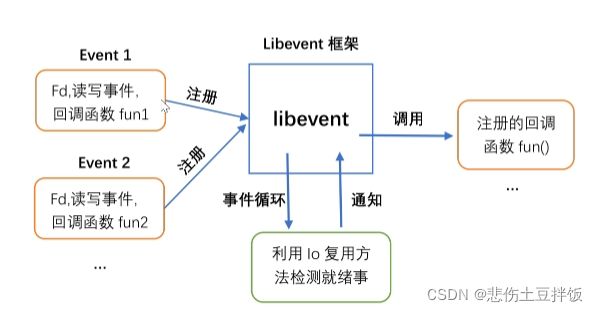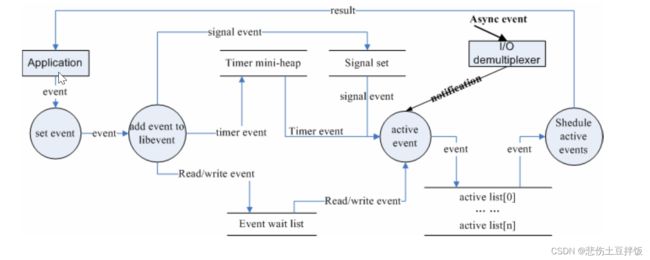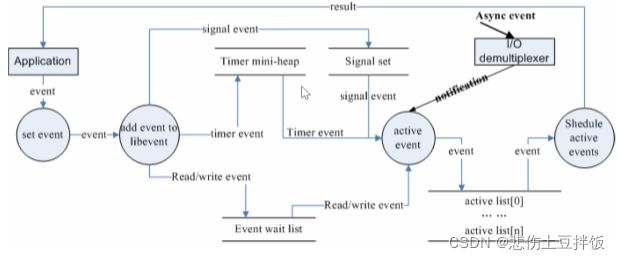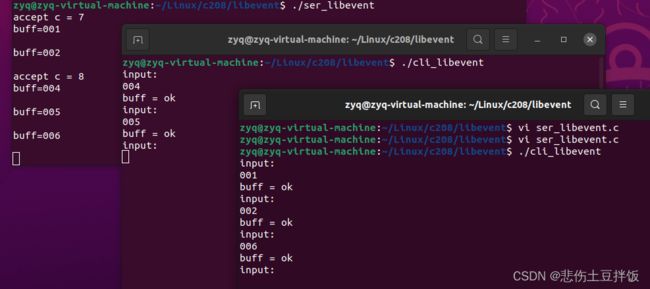Libevent库的介绍与应用
Libevent库
- Libevent概述
- Libevent使用模型
- Libevent库使用示例
- Libevent事件类型和框架结构
- 使用Libevent完成tcp服务端
Libevent概述
Libevent是开源社区的一款高性能的I/O框架库,使用Libevent的著名案例有:高性能的分布式内存对象缓存软件memcached,Googlo浏览器Chromium的Linux版本。作为一个I/O框架库,Libevent具有如下特点:
- 跨平台支持 Libevent支持Linux、Unix和Windows
- 统一事件源 Libevent对I/O事件、信号和定时事件提供统一的处理。
- 线程安全 Libevent使用libevent_pthread库来提供线程安全支持
- 基于Reactor模式的实现
Libevent使用模型

libevent主框架提供注册方法,通过事件循环去检测事件就绪并通知libevent框架去调用回调函数
Libevent库使用示例
#include编译代码
直接编译会显示错误,需要链接libevent库

运行查看

Libevent事件类型和框架结构


设置事件,将事件添加至libevent,其中有三个队列(数据结构为链表)分别存放读写时间、定时器、与信号事件,通过底层I\O复用方法检测,若事件产生就将事件挪至就绪队列中,然后将就绪队列中对应的回调函数一一执行,来相应事件
永久事件需要配合其他事件进行辅助,当我们将事件添加至队列中,当事件产生挪至就绪队列,响应后队列中该事件将不复存在,只相应一次,而永久事件在处理完后,还会再将该事件放回队列,可以将该事件继续检测而不是只检测一次
启动事件循环后,I\O函数会循环检测三个队列上有没有事件产生,若三个队列都为空则会直接退出;或者三个队列不为空,我们调用了退出事件循环的方法退出
在上面的示例中,我们并没有主动去使用事件类型,这是因为我们使用evsignal_new方法以及evtimer_new方法来实现,这两种方法实际上是对event_new方法的封装
![]()
![]()
在这里我们并没有看到我们的事件类型,现在我们将它展开,将创建信号与定时器的事件表现出来
![]()
![]()
修改后的完整代码如下,编译运行查看
#include
定时器不是永久事件,触发一次后就会被移除,而信号事件是永久时间则会一直触发
如果我们删除在添加信号时间时,加入的永久事件
struct event* sig_ev = event_new(base,SIGINT,EV_SIGNAL|EV_PERSIST,signal_cb,NULL);
struct event* sig_ev = event_new(base,SIGINT,EV_SIGNAL,signal_cb,NULL);

这时当程序启动,当libevent内部读写事件,定时事件以及信号事件的队列都为空时,事件循环结束,程序结束,而不像上面会不断循环去检测信号事件

使用Libevent完成tcp服务端
客户端代码
首先创建监听队列去监听读事件来自客户端的连接,然后继续监听读事件来自客户段发送来的消息
#include客户端代码
#include其中event_free(sock_ev)在释放过程中,不仅释放了空间同时会在libevent中移除,而在监听来自客户端发送消息的读事件,无法将其释放,因为我们并没有创建该监听事件的指针(c_ev),想要解决这个问题需要我们间接的将c_ev的指针传入进去(malloc),或者定义一个数组,根据描述符做下标,c_ev来做值实现映射关系。
